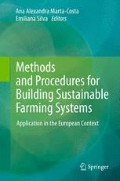Abstract
The response-inducing sustainability evaluation (RISE) is a method for rapid yet holistic sustainability assessment of agricultural production at farm level. Over 600 farms in 18 countries have been analysed using RISE until 2010. We report on lessons learnt from RISE application, with a focus on practical impact. The analysis as such, despite being comparatively farmer oriented and transparent, at best induces reflection. However, it can serve as a “door opener” to address sustainability issues and worked as an instrument to structure discussion with the farmer. Moreover, if the analysis is an integrated part of a process promoting or developing sustainable yet practicable solutions, the farmers may engage for more sustainable production.
Considering the field experience, the RISE sustainability evaluation (indicator framework, software and farm extension process) has been revised until 2012.
Access this chapter
Tax calculation will be finalised at checkout
Purchases are for personal use only
References
Breitschuh, G., Eckert, H., Matthes, I., & Strümpfel, J. (2008). Kriteriensystem nachhaltige Landwirtschaft (KSNL) (in German). Darmstadt: Kuratorium für Technik und Bauwesen in der Landwirtschaft.
Chambers, R. (1994). The origins and practice of participatory rural appraisal. World Development, 22, 953–969.
Christen, O. (1999). Nachhaltige Landwirtschaft – Von der Ideengeschichte zur praktischen Umsetzung (in German). Bonn: FIL.
Food and Agriculture Organisation of the United Nations (FAO). (1995). Trainer’s manual (Sustainability issues in agricultural and rural development policies, Vol. 1). Rome: Food and Agriculture Organisation.
Grunwald, A., & Kopfmüller, J. (2006). Nachhaltigkeit (in German). Frankfurt/New York: Campus-Verlag.
Häni, F., Studer, C., Thalmann, C., Porsche, H., Stämpfli, A. (2008). RISE – Massnahmenorientierte Nachhaltigkeitsanalyse landwirtschaftlicher Betriebe (in German). KTBL-Schrift 467. Darmstadt: Kuratorium für Technik und Bauwesen in der Landwirtschaft.
International Fund for Agricultural Development (IFAD). (2009). Evaluation manual, methodology and procedures. Rome: Office of Evaluation, IFAD.
Meul, M., Van Passel, S., Nevens, F., Dessein, J., Rogge, E., Mulier, A., & Van Hauwermeiren, A. (2008). MOTIFS: A monitoring tool for integrated farm sustainability. Agronomy of Sustainable Development, 28, 321–332.
Pretty, J., Smith, G., Goulding, K. W. T., Groves, S. J., Henderson, I., Hine, R. E., King, V., van Oostrum, J., Pendlington, D. J., Vis, J. K., & Walter, C. (2008). Multi-year assessment of Unilever’s progress towards agricultural sustainability I: Indicators, methodology and pilot farm results. International Journal of Agricultural Sustainability, 6, 37–62.
Rodriguez, J. M., Molnar, J. J., Fazio, R. A., Sydnor, E., & Lowe, M. J. (2009). Barriers to adoption of sustainable agricultural practices: Change agent perspectives. Renewable Agriculture and Food System, 24, 60–71.
Stähli, R., & Egli-Schaft, W. (2008). Aktionsforschung – eine Forschungsmethode auch für die Landwirtschaft (in German). Agrarforschung, 15, 4–6.
United Nations (UN). (1992). Agenda 21. Environment and Development Agenda. www.unep.org/Documents.Multilingual/Default.asp?documentID=52. Accessed 10 January 2012.
von Wirén-Lehr, S. (2001). Sustainability in agriculture – An evaluation of principal goal-oriented concepts to close the gap between theory and practice. Agriculture, Ecosystem & Environment, 84, 115–129.
Zahm, F., Viaux, P., Vilain, L., Girardin, P., & Mouchet, C. (2008). Assessing farm sustainability with the IDEA method – From the concept of agriculture sustainability to case studies on farms. Sustain Development, 16, 271–281.
Author information
Authors and Affiliations
Corresponding author
Editor information
Editors and Affiliations
Rights and permissions
Copyright information
© 2013 Springer Science+Business Media Dordrecht
About this chapter
Cite this chapter
Thalmann, C., Grenz, J. (2013). Factors Affecting the Implementation of Measures for Improving Sustainability on Farms Following the RISE Sustainability Evaluation. In: Marta-Costa, A., Soares da Silva, E. (eds) Methods and Procedures for Building Sustainable Farming Systems. Springer, Dordrecht. https://doi.org/10.1007/978-94-007-5003-6_8
Download citation
DOI: https://doi.org/10.1007/978-94-007-5003-6_8
Published:
Publisher Name: Springer, Dordrecht
Print ISBN: 978-94-007-5002-9
Online ISBN: 978-94-007-5003-6
eBook Packages: Earth and Environmental ScienceEarth and Environmental Science (R0)

